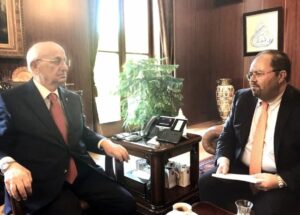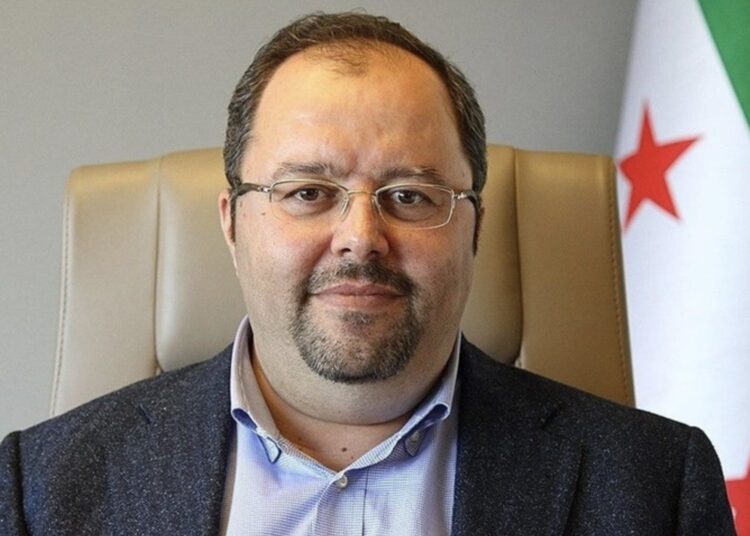Abdullah Bozkurt/Stockholm
A major fraud lawsuit filed in US federal court has exposed an international Ponzi scheme involving a high-profile Syrian opposition figure with close ties to officials in the Islamist government of Turkish President Recep Tayyip Erdogan.
The 97-page civil complaint, filed on June 26, 2025, in the US District Court for the District of Massachusetts, accuses Syrian opposition figure Mustafa Sabbagh, 60, and his son Mahmoud Sabbagh of orchestrating a large-scale fraud scheme that targeted investors on the pretense of supporting Syrian refugee causes and Turkish financial ventures in real estate, hospitality, jewelry and currency exchange businesses.
Both father and son are naturalized Turkish citizens, according to trade registry filings they submitted in Turkey and obtained by Nordic Monitor. Although the elder Sabbagh settled in Doha after leaving Syria, he chose Turkey as his primary residence, establishing multiple businesses there while actively promoting the Syrian opposition. He has developed close ties with senior Turkish government officials, including meetings with the foreign minister and the president in his capacity as a prominent Syrian opposition figure.
US civil suit accuses prominent Syrian opposition figure operating a Ponzi scheme out of Turkey:
Sabbagh was even featured in President Erdogan’s Millet (Nation) Library — the largest in the country — after donating a collection of his books, for which he was praised by the president’s office.
Sabbagh’s close ties to the Erdogan government helped him secure a landmark deal in March 2020, when he was granted a generous 35-year lease for a historic building named 5. Vakıf Han, located near the Sirkeci train station in the heart of Istanbul. He invested in converting the property into a 57-room luxury hotel, with local officials facilitating all necessary licenses and permits for the restoration.
Sabbagh acquired the lease through GFKA Turizm ve Antrepo İşletme Anonim Şirketi, a tourism and logistics company he purchased for this investment. The Turkish government even waived the environmental impact assessment requirement for the restoration, which was estimated to cost 404.3 million Turkish lira as of December 2023.
İnce Gold Altın Kuyumculuk ve Dış Ticaret Anonim Şirketi (İnce Gold), founded in August 2017 by Mustafa Sabbagh in Istanbul:
Either independently or jointly with his son, Sabbagh owns several other businesses. According to trade registry records, he controls a jewelry, construction and real estate company, İnce Kuyumculuk İnşaat ve Gayrimenkul Danışmanlığı Ticaret Limited Şirketi, established in December 2017. He also owns a foreign trade and precious metals company, İnce Gold Altın Kuyumculuk ve Dış Ticaret Anonim Şirketi (İnce Gold), founded in August 2017.
At the center of the Ponzi scheme is İnce Gold, which was used as a front to solicit over $4 million from Emadeddin Z. Muntasser, a Libyan-American entrepreneur and human rights advocate based in Massachusetts.
According to court filings, Muntasser was lured into investing in what was presented as a regulated Turkish money transfer and currency exchange business. However, the funds were allegedly misappropriated to prop up unrelated hotel investments and personal luxury expenses, including a Bosporus waterfront mansion and a fleet of luxury cars in Istanbul.

The lawsuit paints a damning portrait of how political and charitable capital in the Syrian exile community was exploited for private gain. Sabbagh, a former secretary-general of the Syrian interim government and a prominent figure in exile circles, allegedly used his status and affiliations — particularly with the US-based NGO Syrian Forum — to gain investor trust.
The American charitable organization Syrian Forum, co-founded by Sabbagh and two other defendants — Ghassan Hitto (a former interim prime minister of the Syrian opposition) and M. Yaser Tabbara (a Chicago-based attorney) — raised millions of dollars from US and European donors to help Syrians displaced in the civil war.
The defendants also held senior leadership positions in the formation and development of the Syrian interim government in 2011 with support from Turkey to counter, and potentially replace, the Bashar al-Assad regime.
İnce Kuyumculuk İnşaat ve Gayrimenkul Danışmanlığı Ticaret Limited Şirketi is another Turkish company established by Mustafa Sabbagh:
The NGO, active in humanitarian aid for Syrian refugees, is accused of being misused as a platform to identify wealthy donors and deflect scrutiny from the alleged criminal enterprise.
The complaint further alleges that the defendants forged monthly financial statements, concealed losses and later attempted to silence Muntasser with intimidation tactics, including veiled threats and emotional blackmail — warning that public exposure of the fraud would harm the Syrian refugee cause.
Compounding the scandal is the revelation that İnce Gold was never licensed by Turkish regulators to conduct currency exchange or money transfers — contrary to documents distributed to investors by the Sabbagh-led Sabbagh Investment Group (SIG).

The misappropriated funds from investors helped Sabbagh purchase a large, waterfront home along the shores of the Bosphorus in Istanbul — one of the wealthiest and most coveted areas in the city — with a fleet of luxury cars operated by private drivers.
The complaint outlines multiple counts, including fraud, conspiracy, racketeering, breach of fiduciary duty and violations of US securities laws. It also details how Turkish entities and infrastructure were allegedly used to launder proceeds and perpetuate the scam across borders.
The US court has been asked to order the return of Muntasser’s $4 million investment and hold the defendants accountable under federal securities and racketeering laws.
This case could have broader implications for Turkey’s role as a safe haven for politically connected businessmen operating under the cover of humanitarian causes, especially those linked to the Syrian opposition. Turkish authorities have so far remained silent on the allegations.













